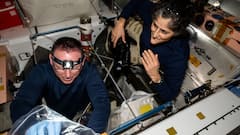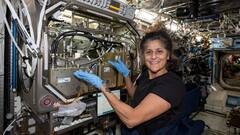In A First, Cancer Tumours Disappear From Every Patient In Drug Trial: Report
Surprisingly, the cancer had vanished in every single patient, and was undetectable by physical examination, endoscopy, or Magnetic Resonance Imaging (MRI) scans.

For the first time in the history of cancer, tumours have disappeared from every patient involved in a drug trial. As many as 18 rectal cancer patients participated in the trial, and each of them was given the same drug.
Surprisingly, the cancer had vanished in every single patient, and was undetectable by physical examination, endoscopy, or Magnetic Resonance Imaging (MRI) scans. The study describing the results was recently published in the New England Journal of Medicine.
According to a report published by The New York Times (NYT), Dr Luis A. Diaz Jr of Memorial Sloan Kettering Cancer Center, said he knew of no other study in which a treatment completely obliterated a cancer in every patient.
"I believe this is the first time this has happened in the history of cancer," the report quoted Dr Diaz as saying.
What Do Experts Say About The Trial?
The trial was funded by pharmaceutical company GlaxoSmithKline. Dr Alan P. Venook, a colorectal cancer specialist at the University of California, San Francisco, who was not involved in the study, said he also thought this was a first, and that a complete remission in every single patient is "unheard-of".
According to the report, the rectal cancer patients had undergone gruelling treatments, such as chemotherapy, radiation and surgery that could result in bowel, urinary and sexual dysfunction. Some cancer patients even required colostomy bags, which are plastic bags that collect faecal matter from the digestive tract through an opening in the abdominal wall called stoma.
The cancer patients participated in the trial thinking that they would have to undergo the procedures again after the study was over because they did not expect their tumours to disappear.
However, they were surprised when they found that their cancer had vanished, and that no further treatment was necessary.
Dr Andrea Cercek, an oncologist at Memorial Sloan Kettering Cancer Center and a co-author on the paper, said that there were a lot of happy tears, according to the report. The paper was presented at the annual meeting of the American Society of Clinical Oncology on June 5, 2022.
Dr Venook added that another surprise was that none of the patients had clinically significant complications.
What Drug Was Given To The Patients?
The study found that on average, one in five patients have some sort of adverse reaction to dostarlimab, the drug the patients took. Dostarlimab is also known as a checkpoint inhibitor. The medication, which was given every three weeks for six months, unmasks cancer cells, allowing the immune system to identify and destroy them, and costs about $11,000 per dose.
Most adverse reactions are easily managed, the report said. However, as many as three to five per cent of patients who take checkpoint inhibitors have more severe complications. In some cases, these complications can result in muscle weakness and difficulty swallowing and chewing.
According to Dr Venook, the absence of significant side effects means either they did not treat enough patients, or somehow, these cancers are just plain different, the report said.
Dr Hanna K Sanoff of the University of North Carolina's Lineberger Comprehensive Cancer Center, who was not involved in the study, said in an editorial accompanying the paper that it is not clear if the patients are cured. She added that very little is known about the duration of time needed to find out whether a clinical complete response to dostarlimab equates to cure.
According to Dr Kimmie Ng, a colorectal cancer expert at Harvard Medical School, the results were remarkable and unprecedented, but would need to be replicated.
A Similar Trial Was Conducted In 2017
In 2017, Dr Diaz led a clinical trial which was funded by Get an drugmaker Merck. The inspiration for the rectal cancer study came from that trial. As many as 86 people with metastatic cancer that originated in various parts of their bodies were involved in the trial. The cancers shared a gene mutation which prevented cells from repairing damage to DNA, and the mutations occur in four per cent of all cancer patients.
A Merck checkpoint inhibitor called pembrolizumab was given to the patients involved in the trial. They took the drug for up to two years. In about one-third to one-half of the patients, the tumours shrank or stabilised. These patients lived longer. The tumours were observed to vanish in 10 per cent of the trial participants.
Dr Cercek and Dr Diaz wondered what would happen if the drug were used much earlier in the course of the disease, before the cancer had a chance to spread, the report said.
Rectal Tumours Of Patients Involved In New Trial Grew During Treatment
Therefore, they decided to study patients with locally advanced rectal cancer, in which the tumours had spread in the rectum and sometimes to the lymph nodes but not to other organs. It was observed that chemotherapy was not helping a portion of patients who had the same mutations that affected the patients in the 2017 trial. The rectal tumours grew instead of shrinking during treatment, Dr Cercek found.
Why Researchers Decided To Give Immunotherapy With A Checkpoint Inhibitor
Therefore, Dr Cercek and Dr Diaz reasoned that immunotherapy with a checkpoint inhibitor would allow such patients to avoid chemotherapy, radiation and surgery, the report said.
When Dr Diaz asked companies that made checkpoint inhibitors if they would sponsor a small trial, they turned him down, saying that the trial was too risky. Dr Diaz and Dr Cercek wanted to give a checkpoint inhibitor to patients who could be cured with standar treatments. This is because what the researchers had proposed might end up allowing the cancers to grow beyond the point where they could be cured, according to the report.
Dr Diaz said it is very hard to alter the standard of care, and that the whole standard-of-care machinery wants to do the surgery.
A small biotechnology firm called Tesaro, which was later bought by GlaxoSmithKline, agreed to sponsor the study.
The Experience Of The First Patient To Join The Trial
According to the report, the first patient to join the trial was Sascha Roth, who was 38 years of age at that time. Roth noticed some rectal bleeding for the first time in 2019, but otherwise felt fine. Her gastroenterologist, who conducted a biopsy on her tumour said it is definitely cancer. Roth said that on hearing this, she completely melted down.
Roth decided to participate in the trial, but was not expecting a complete response to dostarlimab, and had planned to move to New York for radiation, chemotherapy and possible surgery after the trial ended, according to the report. She also had her ovaries removed and put back under her ribs to preserve her fertility after the expected radiation treatment.
After the trial was complete, Dr Cercek told Roth that the researchers looked at her scans, and there is absolutely no cancer. Also, she did not need any further treatment. When Roth informed her family of this, they did not believe her, she said.
Two years after the trial, Roth still does not have a trace of cancer.
Check out below Health Tools-
Calculate Your Body Mass Index ( BMI )

Trending News
Top Headlines












































